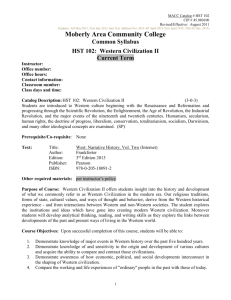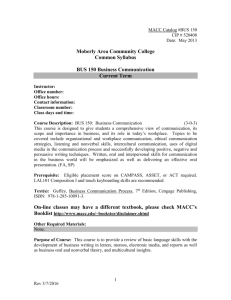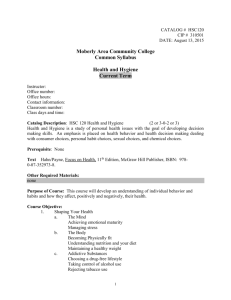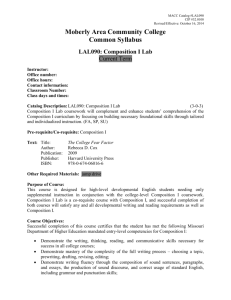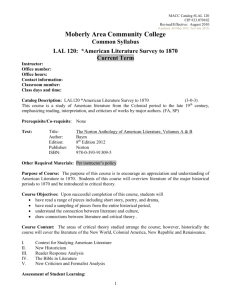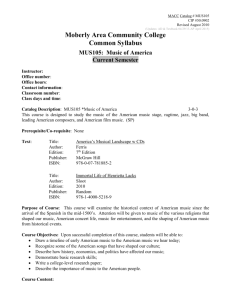HST 201 American Women, American Times
advertisement
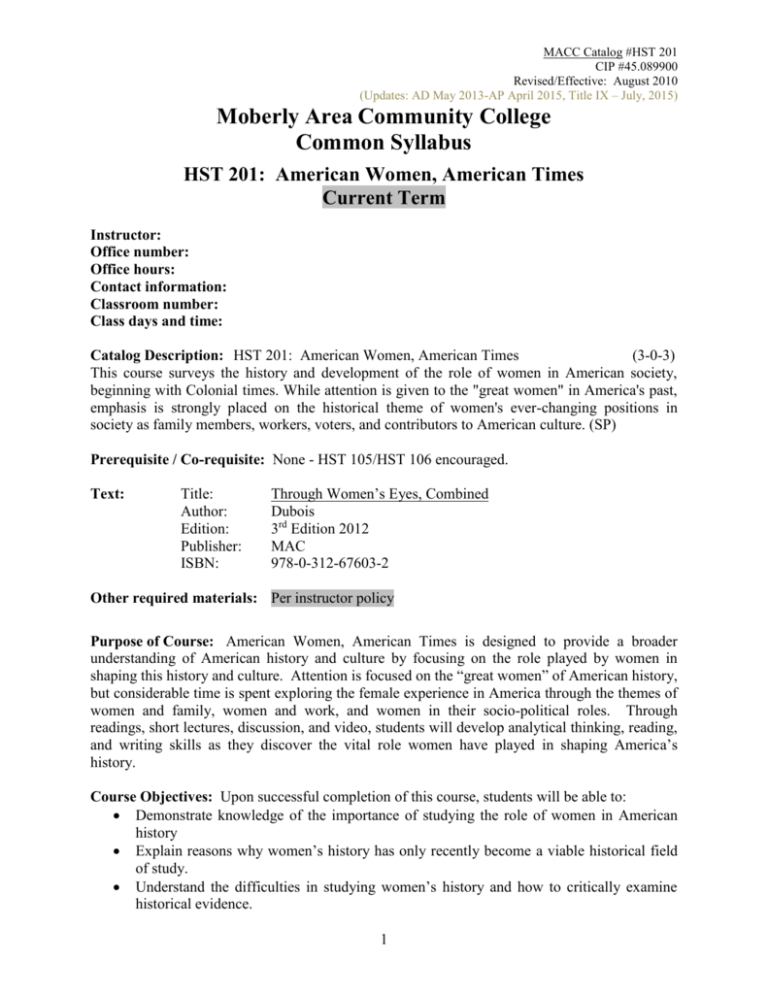
MACC Catalog #HST 201 CIP #45.089900 Revised/Effective: August 2010 (Updates: AD May 2013-AP April 2015, Title IX – July, 2015) Moberly Area Community College Common Syllabus HST 201: American Women, American Times Current Term Instructor: Office number: Office hours: Contact information: Classroom number: Class days and time: Catalog Description: HST 201: American Women, American Times (3-0-3) This course surveys the history and development of the role of women in American society, beginning with Colonial times. While attention is given to the "great women" in America's past, emphasis is strongly placed on the historical theme of women's ever-changing positions in society as family members, workers, voters, and contributors to American culture. (SP) Prerequisite / Co-requisite: None - HST 105/HST 106 encouraged. Text: Title: Author: Edition: Publisher: ISBN: Through Women’s Eyes, Combined Dubois 3rd Edition 2012 MAC 978-0-312-67603-2 Other required materials: Per instructor policy Purpose of Course: American Women, American Times is designed to provide a broader understanding of American history and culture by focusing on the role played by women in shaping this history and culture. Attention is focused on the “great women” of American history, but considerable time is spent exploring the female experience in America through the themes of women and family, women and work, and women in their socio-political roles. Through readings, short lectures, discussion, and video, students will develop analytical thinking, reading, and writing skills as they discover the vital role women have played in shaping America’s history. Course Objectives: Upon successful completion of this course, students will be able to: Demonstrate knowledge of the importance of studying the role of women in American history Explain reasons why women’s history has only recently become a viable historical field of study. Understand the difficulties in studying women’s history and how to critically examine historical evidence. 1 MACC Catalog #HST 201 CIP #45.089900 Revised/Effective: August 2010 (Updates: AD May 2013-AP April 2015, Title IX – July, 2015) Analyze women’s roles in key social, historical, and political events and movements in America. Demonstrate basic skills in critical thinking and reading. Write college-level English. Course Content: I. Introduction / What Is Women’s History? II. Colonial and Revolutionary Women III. Early 19th Century Women 1800 – 1860 IV. From The Civil War Through The Attainment Of Suffrage Assessment of Student Learning: Student outcomes of the above objectives will be measured through a research paper assignment, an interview paper, and through essay examinations, including a comprehensive final exam. Class participation is used only in determining borderline grades; this participation is measured by attendance and by participation in class discussions. Grading Scale: A = 90% 540 – 600 points B = 80% 480 – 539 points C = 70% 420 – 479 points D = 60% 360 – 419 points F = below 60% Below 360 points Although no pop quizzes are listed on the syllabus, they are always an option, so it pays to be prepared. Read your assigned text before coming to class; this will also help you to understand the material better. You are responsible for any assigned text material as well as lecture materials and videos for exams. I strongly encourage you to take notes. If you miss class, please see me or one of your classmates to find out what you missed. Description of Major Assignments/Projects: INTERVIEW WRITING ASSIGNMENT Your assignment is to interview a woman who is at least 70 years old and ask about her experiences. Experiences you might want to ask about include: the Great Depression, WWII, the women's movement, the Korean and Vietnam Wars, recent achievements of women, etc. Be sure to include material specific to her life -- was/is she rural, urban, married, divorced, etc. You might also question her about her thoughts/experiences with work, family, and the socio-political roles of women (the major themes we'll discuss in class). There is not a specific format that your paper has to be written in -- you may use a traditional question/answer format or integrate your material into paragraphs. Try to incorporate any historical background gained from class lectures and discussions. Also be sure to use quotation marks if you directly quote the person. A bibliography should be included which gives the respondent's name and full information including date of interview, place of residence, age, and occupation. Any additional sources should be noted on this bibliography page also, and you must use an endnote page if you quote directly (or use an author's ideas) from any of these outside sources. Your written paper should be 4 to 5 pages typed and double-spaced. Most students find this to be a rewarding assignment. If you are having some problems structuring your interview, please ask for help. AMERICAN WOMEN, AMERICAN TIMES / RESEARCH PAPER 2 MACC Catalog #HST 201 CIP #45.089900 Revised/Effective: August 2010 (Updates: AD May 2013-AP April 2015, Title IX – July, 2015) The other major out-of-class assignment for this course will be a 5-7 page (doublespaced, typed) research paper. There will not be a list of topics for you to choose from, but all topics must be approved by me. GUIDELINES FOR PAPER: 1. Not Acceptable Topics include: Harriet Tubman, Elizabeth Cady Stanton, Susan B. Anthony, Harriet Beecher Stowe, Amelia Earhart, Clara Barton, Eleanor Roosevelt and Roe v. Wade or abortion. 2. If you choose to do your paper on a person, it must not be a strictly biographical paper. You must relate that person to larger issues or trends in women's history (and not just in 1 or 2 paragraphs at the end of the paper). 3. Your paper must have at least 3 sources other than your textbook, and only 1 of these sources can be an encyclopedia or a dictionary. All sources need to be fully cited, especially those that come from any electronic media. Your paper should include endnotes and a bibliography. MLA, APA, or Chicago Manual of Style are all acceptable forms for the endnotes and bibliography, but please be consistent. 4. A note on plagiarism: If you use an idea promoted by an author, or quote something exactly, it must be cited. In the case of quotes, they must also be put in quotation marks. Plagiarism is serious business and is punishable by a zero grade on the assignment, flunking the course, or even being dismissed from school. Statement to Connect Course with General Education Outcomes or Technical Program Outcome Statement: In compliance with MACC’s General Education outcomes, the student who successfully completes this course will be able to: Demonstrate effective written and oral communication skills Demonstrate knowledge of how history has shaped society and culture, understand how the individual relates to society and culture, appreciate cultural diversity, understand human behavior and mental processes, and understand human development. Instructor Policies: Academic Dishonesty: MACC board policy is as follows: “Academic dishonesty by students damages institutional credibility and unfairly jeopardizes honest students; therefore, it will not be tolerated in any form.” Forms of academic dishonesty include but are not limited to the following: violations of copyright law, plagiarism, fabrication, cheating, collusion, and other academic misconduct. Incidents of dishonesty regarding assignments, examinations, classroom/laboratory activities, and/or the submission of misleading or false information to the College will be treated seriously. The procedure for handling academic dishonesty is outlined in the Student Handbook (Policy Handbook M.010). In cases of alleged academic dishonesty, the burden of proof is on the student, not on the instructor. Attendance Policy: Any student who misses two consecutive weeks of class during a regular sixteen-week semester or the equivalent proportion of class time during a shorter session will be dropped from the class by the instructor unless acceptable justification is supplied. An instructor must complete and file the appropriate forms to drop the student within one week following the 3 MACC Catalog #HST 201 CIP #45.089900 Revised/Effective: August 2010 (Updates: AD May 2013-AP April 2015, Title IX – July, 2015) student’s violation of the attendance policy. Additionally, any student who misses more than one-fourth of the entire number of in-seat class meetings in a regular 16-week semester or the equivalent proportion of class time during a shorter session, may be dropped from that class by the instructor if, in the opinion of the instructor, the student does not have reasonable opportunity to succeed in the class. A student’s attendance rate will be calculated based upon the first day of the semester (not the student’s date of enrollment in the course.) Student attendance must be defined in a different manner for online, hybrid, and virtual courses. Student attendance in these courses is defined as active participation in the course. Online, hybrid, and virtual courses will, at a minimum, have weekly mechanisms for student participation, such as any or all of the following methods: a. Completion of quizzes or exams b. Submission of assignments c. Participation in threaded discussions d. Communication with the instructor A student who does not participate in an online, hybrid, or virtual course for two consecutive weeks will be dropped by the instructor unless acceptable justification is supplied. An instructor must complete and file the appropriate forms to drop the student within one week following the student’s violation of the attendance policy. As with ground courses, a student’s attendance rate in online courses will also be calculated based upon the first day of the semester. If a student does not demonstrate active participation in the online course within the first two weeks (or the equivalent proportion of class time during a short session), the student will be dropped as “never attended.” Simply logging into an online class does not constitute active participation. Students should be aware that their dropping a course and their last date of attendance in the course may impact their financial aid. (Policy Handbook I.090 and M.095) Tardiness: Per instructor’s policy. Make-up and late work: Per instructor’s policy. Extra-credit work: Per instructor’s policy. Schedule of Student Assignments / Activities: This is a tentative schedule. The list of topics is only a general description of what will be covered. UNIT 1 -- COLONIAL AND REVOLUTIONARY WOMEN Introduction -- What Is Women's History? Chapters 1 and 2 Early Colonial Women -- The Struggle For Survival Women And Religion Chapters 3 and 4 Changing Economic And Social Conditions Legal Status Of Women / Revolutionary America? EXAM # 1 4 MACC Catalog #HST 201 CIP #45.089900 Revised/Effective: August 2010 (Updates: AD May 2013-AP April 2015, Title IX – July, 2015) UNIT 2 -- EARLY 19TH CENTURY WOMEN 1800 - 1860 Chapters 5 and 6 Educating Women Early Women in the Work Force Promoting Women's Sphere Chapters 7 and 8 Reforming Society with the Help Of Women Reform for Women? EXAM # 2 UNIT 3 – FROM CIVIL WAR THROUGH THE ATTAINMENT OF SUFFRAGE Chapters 9 and 10 Effects of the Civil War Changing Work Roles for Women Chapters 11 and 12 Smaller Families Professional Women -- Still a Rarity Chapters 13 and 14 The Crusade for Suffrage Suffrage vs. Society -- Women Being Political? EXAM # 3 UNIT 4 -- AMERICAN WOMEN SINCE THE 1920s Chapters 15 and 16 Issues of Sexuality, Marriage And Family A Consumer Revolution Chapters 17 and 18 Women and the Depression The Impact of World War II Chapters 19 and 20 Reviving Feminism After WWII Issues Beyond the Vote Chapters 21 and 22 New Economic Roles for Women Changing Families / Changing American Demographics The Continuing Gender Gap EXAM # 4 ADA Statement Students who have disabilities that qualify under the Americans with Disabilities Act may register for assistance through the Office of Access and ADA Services. Students are invited to contact the Access Office to confidentially discuss disability information, academic accommodations, appropriate documentation and procedures. For more information, please call either the Moberly office at (660) 263-4100 x 11240 or the Columbia office at (573) 234-1067 x 12120, or visit our web page at http://www.macc.edu/index.php/services/access-office. 5 MACC Catalog #HST 201 CIP #45.089900 Revised/Effective: August 2010 (Updates: AD May 2013-AP April 2015, Title IX – July, 2015) Title IX Statement MACC maintains a strict policy prohibiting sexual misconduct in any form, including sexual harassment, sexual discrimination, and sexual violence. All MACC employees, including faculty members, are considered mandated reporters of sexual misconduct and as such are expected to contact the Title IX Coordinator when they become aware, in conversation or in writing, of an incident of sexual misconduct. For more information on this policy or to learn about support resources, please see http://www.macc.edu/sexual-misconduct-policy or contact Dr. Jackie Fischer, MACC’s Title IX Coordinator, at 660-263-4110, ext. 11236 or jackief@macc.edu. 6


